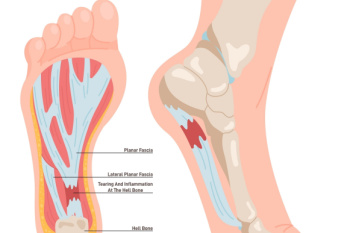
Plantar fasciitis is a common cause of heel and arch pain, often linked to overuse, tight calf muscles, poor foot mechanics, or worn-out footwear. Plantar fasciitis occurs when repeated strain on the plantar fascia, a band of tissue under the foot, leads to tiny tears where it attaches to the heel. Stretching the calf and foot muscles may help relieve strain on the plantar fascia, while strengthening foot muscles can provide better support. Custom orthotics or inserts are often recommended to improve foot alignment and cushioning. Night splints may also be advised, as they help stretch the foot during sleep, possibly easing morning pain. A chiropodist can guide you on reducing strain from activities that aggravate symptoms and help you choose footwear that supports your foot structure. If you have symptoms of plantar fasciitis, it is suggested that you schedule an appointment with a chiropodist for expert advice and guidance.
Plantar fasciitis can be painful and interfere with your daily activities. If you are experiencing foot or heel pain and believe you may be afflicted with plantar fasciitis, please consult with Emily Yu, B.Sc from Uptown Foot Care Clinic. Our specialist will assess your condition and provide you with quality foot and ankle treatment.
What Is Plantar Fasciitis?
Plantar fasciitis refers to the inflammation of the plantar fascia, a ligament that runs along the bottom of the foot and connects the heel bone to the toes. Repetitive activities, such as running or jumping, can injure the plantar fascia over time. Plantar fasciitis can also be caused by flat feet, high arches, pregnancy, and activities that put excessive pressure on your feet, like standing all day for work. When the plantar fascia becomes inflamed, it causes pain and discomfort.
Symptoms
Typical symptoms of plantar fasciitis include:
Stabbing pain near the heel
Pain that is worst in the morning or after a period of rest
Pain that increases after exercising
Swelling
Tightness in the Achilles tendon
Diagnosis
Plantar fasciitis is typically diagnosed via medical history and physical examination.
Treatment
Treatments for plantar fasciitis include resting and icing the affected foot, stretching the foot, taking medications to reduce inflammation, and wearing orthotics. In severe cases where pain does not improve with conservative treatments, injections or surgery may be recommended.
If you have any questions, please feel free to contact our office located in . We offer the newest diagnostic and treatment technologies for all your foot care needs.
